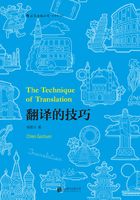
叁 由内容来分的造句
(1)用平叙句来翻译
平叙句(Declarative或Assertive Sentence)是叙述事实的文句,我们日常讲话,大部分都是用的这种句子。如我在本书前面讲过的,英文的句型共有五种,其用字的排列次序为:
1. “主语+ 自动词”,如Birds sing.(鸟鸣。)
2. “主语+ 自动词+ 补语”,如The rose smells sweet.(玫瑰花香。)
3. “主语+ 他动词+ 宾语”,如He has plenty of sense.(他富有见识。)
4. “主语+ 他动词+ 间接宾语+ 直接宾语”,如He teaches us English.(他教我们英文。)
5. “主语+ 他动词+ 宾语+ 补语”,如You must keep it a secret.(你必须保守秘密。)
英文句中用字的排列次序常有变化,并不一定照这五种句型的规矩来说。兹就惯用法找出一些变化的形式,来作为平叙句的译法;至于普通五种句型所表现的平叙句法,因为前面已经详细讲过了,所以这儿不拟再说。
(一)There + 动词 + 主语
凡说到事物或人的有无时,在主语所含文字较长的情形下,为引起听者对主语的注意起见,在应说主语的地位上,用there一字充数,而将真正的主语移到后面去说,如
桌子上有一本书。
There is a book on the desk.
后来他确知悔悟了。
There came a time when he did repent.
人们看到了一个奇异的光景。
There was seen a strange sight.
从前有一位大王名叫亚菲来德。
Once there lived a great king whose name was Alfred.
一切寂静无声。
There fell a deep silence.
(二)把条件句中的连词省略,而将助动词放在主语的前面去,本动词的be及have,也有这种助动词同样的用法。例如:
如果你找到了,请告诉我。
Should you find them,kindly let me know.
她要有一个小孩的话,她就快乐了。
Had she a child,she would be happy.
他要是还在世,他会怎样说呀!
Were he alive,what would he say?
我要是见到了他,我会责备他的。
Did I see him,I would blame him for it.
(三)副词(片语) + 动词 + 主语
为着引起读者的注意或好奇心起见,又为着保持字数较多的主语和动词的密切结合起见,常把动词放到主语的前面去。在这种情况下,也有采用there的时候。
一个女郎和一条狗来到街头了。
Down the street came a girl and a dog.
名单上还可加入下列的名字。
To the list may be added the following names.
在房间的当中,枝形吊灯下面,站着老家长乔戎。
In the centre of the room,under the chandelier,stood the head of the family,old Jolyon.
在他后面走进来一个身材高大的女人,体态丰腴,容仪端正,头发还是棕色的——那就是瓦丽斯夫人。
Behind him had come in a tall woman,of full figure and fine presence,With hair still brown—Lady Valleys herself.
(四)为着加强副词(片语),补语、宾语或本动词起见,常将这种字放在一句的头上。
1. 惊叹词变来的副词及介词,与同形的副词及here,there。

(a)枪声砰的一响,那鸟就掉下来了。
Bang went the gun,and the bird fell.
砰的一下又是一声枪声。
Bang came another shot.
皮鞭重重地抽去。
Crack goes the whip!
(b)天花板掉下来了。
Down came the ceiling.
他走下去了。
Down he went.
老鼠都跳进去了。
In plunged the rats.
我们像一阵风似的走了。
Off we went like the wind.
笛声一再高扬。
On and on went the puper.
行行复行行。
On and on they went.
那对夫妇一下就冲出去了。
Out rushed the man and his wife.
他们冲出去了。
Out they rushed.
马车驰过去了。
Over went the carriage.
他拿着盘子走过去了。
Over he went with the dish.
蜻蜓轰然上升。
Up went this roaring dragonfly.
他们上去了。
Up they went.
(c)托孟来了。
Here comes Tom.
他来了。
Here he comes.
这是你的上衣。
Here is your coat.
这就是的。
Here it is.
那是你的手套。
There are your gloves.
那就是的。
There they are.
注意:here,there如做“在这里”,“在那里”解时,仍可放在句首,但字的排列要照普通的顺序,如Here the game keeper found the dead body.(猎场看守人在这里找到了那尸体。)There Scott wrote all his works.(史各特就在那里写出了他全部的著作。)
2. 上述1. 项以外的副词及副词片语。
副词(片语) + 助动词 + 主语 + 本动词
我们对于这个决定深为后悔。
Bitterly did we repent our decision.
那情景我记得很清楚。
Well do I remember the scene.
我曾指出时间是过得很快的,但是徒然。
In vain did I point out how time was getting on.
我们再也见不到他的面了。
Never shall we see his face again.
我做梦也未曾想到这样的事。
Never had I even dreamed of such a thing.
对于这个使命我决不再向前移动一步。
Not another step will I budge on this errand.
直到那个时侯我才实感到形势的危险。
Not till then did I realize the danger of the situation.
他不但从来没有踏进大门来过,甚至连在窗口也没有露过面。
Not only did he never cross the threshold,but he never so much as showed his face at a window.
为着闲人去游荡,世界上再没有比伦敦更好的地方了。
Nowhere in the world is there such a place for an idle man as London.
我们没有想到会再也见不到他的。
Little did we think that we should never see him again.
他一进房来就破口大骂。
Scarcely had he entered the room when he broke out in insults.
那对他们最没有兴趣的了。
Least of all is it to their interest.
我看见过他好多次。
Many a time have I seen him.
这种光景我以前只见到过一次。
Only once before have I seen such a sight.
他只有一次对我说过话。
Only on one occasion did he speak to me.
迟迟地他才明白那火灾是发生在他自己家里。
Only slowly did he understand that the fire was in his own house.
3. 补语:
补语 + 主语 + 动词
(a)罗杰始终是一个坏脾气的家伙。
Cantankerous chap Roger always was.
他们非常感谢我要援助他们。
Very grateful they were for my offer of help.
幸而我们知道她的名字。
Lucky it is that we know her name.
(b)我的懊悔是痛苦而无益的。
Bitter but unavailing were my regrets.
我采取正当措施极为有效。
So effective it is that I have taken the right measures.
4. 宾语:
宾语 + 主语 + 动词
宾语 + 助动词 + 主语 + 本动词
(a)我们虽然能够知道过去,但对未来却只能推测。
The past one can know,but the future one can only feel.
我们高兴地记得许多事情,也高兴地忘却许多事情。
Many things we gladly remember,others we gladly forget.
金银我都没有,我所有的只有这些,现在都给你好了。
Silver and gold have I none,but such as I have give I thee.
(b)他没有给她说一句好话。
Not a word did he say in her favour.
不到最后一张纸印好,他们谁也不会有一分钟休息的。
Not a moment’s rest will any of the men enjoy until the last paper is printed.
只有两个人死去了,没有继续受苦。
Only two had merciful death released from their sufferings.
5. 本动词:
你抱怨也得去。
Growl you will and go you must.
他说我们必须赶上她。
He says overtake her we must.
因为我们必须找到那个解毒剂,不然就得发现民主政治是欺诈的。
For find that antidote we must,or discover democracy to be fraudulent.
“如果你马上打电报去,他是可以阻止的。”而他就是这样被阻止了。
“If you telegraph at once,he can be stopped.” And stopped he was.
(五)为着和上文联系,某些字眼要放在句首。
这种威胁他简直无法实行。
This threat he was quite unable to carry out.
这到底是什么我说不出来。
What it is I cannot tell.
这个议论的全程有赖于此。
On this depends the whole course of the argument.
我相信那些话是有预言意味的。在那些话中间有着劳工阶级成功地进行斗争的秘密。
I believe those words are prophetic. In them is the secret of a successful prosecution of the struggle of the working class.
随后就吹起逆风来了。
Then came unfavourable winds.
其次就是付款的问题。
Next comes the question of pay.
这便是此人的生平与性格。
Such are the life and character of this man!
医生在他的(创办医院的)计划书上这样说。
So the physician said in his prospectus.
他加速了他的步伐,我也如此。
He quickened his pace,and so did I.
你们错了,我们也错了。
You were wrong,so were we.
“你现在一定要去睡觉呀。”“正是。你也是呀。”
“You must go to bed now.”“So I must. So must you.”
树倒下来了,一定会死的。
As the tree falls,so must it die.
种瓜得瓜,种豆得豆。
As a man soweth,so shall he reap.
自作自受。
As you make your bed,so you must lie on it.
那件事他什么也不知道。他的妻子也和他一样。
He knew nothing about it. No more did his wife.
试想想田野的百合是怎样生长的;它们既不劳动,也不纺织。
Consider the lilies of the field,how they grow;they toil not,neither do they spin.(Matt.6:28)
我也不必告诉你,我做这些事是凭什么职权。
Neither do I tell you by what authority I do these things.
那一切都是真的,我们不可忘记。
All that is true,nor must we forget.
我不知道,我也猜不出来。
I know not,nor can I guess.
我不告你虚伪,更不告你欺诈。
I do not accuse you of falsehood,still less(do I accuse you)of dishonesty.
习题9
1. 笨人无药可医。
2. 她每星期写一封信回家。
3. 他把钱都花在买书上面了。
4. 阔人也和穷人一样烦恼。
5. 这个礼拜下了不少的雨。
6. 现在是到了要思索的时候。
7. 她的缝纫机原来就是放在这里的。
8. 在他后面接着来了长蛇似的兵马。
9. 一按机关地雷立刻爆炸。
10. 在蒙茅斯要塞陆军通讯队所养的鸽子是最有代表性的。
11. 人们最喜欢的就是名利。
12. 杯中只有一点水。
13. 罕有比这更为忙乱的。
14. 他要看到了我,立刻就会认识的。
15. 他甫发言,听众就阻碍他。
16. 关于此事我们意见不同的地方就在此。
17. 他们得看护病伤的人。
18. 他不会成功的,虽则他从未这样努力试过。
19. 知足的人是幸福的。
20. 那演说家如是说。